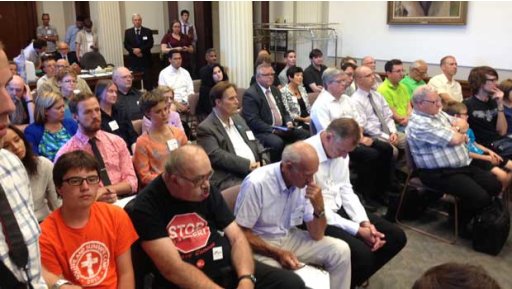Augustine United Church Support for Bill 18
August
2013
 |
| Audience gathered on evening of Augustine's presentation (Source: CBC News) |
Good
evening. Thank you for this opportunity
to speak. My name is Kathleen Venema and
I am here today representing Augustine United Church, where my husband and I
are long-time members. Many of you
likely know Augustine as an architectural landmark near the corner of River and
Osborne, and one of Winnipeg’s historic churches, originally established in
1887. Many people may also know that
Augustine was the first Affirming United Church in Canada. Let me provide just a bit of background to
explain that designation. Almost 30
years ago, in 1984, after extensive theological study and discussion, the
United Church of Canada specifically affirmed its recognition that all human beings, regardless of
sexual orientation, are made in the image of God. At that point, it issued a call for
repentance for the church’s collective history of rejecting homosexual
persons. In 1988, after four more years
of study and discussion, the United Church’s General Council affirmed that “all
persons, regardless of sexual orientation […] are welcome to be or become full
members of the church,” and specifically articulated its readiness to ordain
gay and lesbian clergy
[http://www.united-church.ca/exploring/orientation/timeline].
In
1995, having been open and supportive of gays and lesbians since the late 1970s,
Augustine became the first Affirming United Church Congregation in Canada. From that point on, Augustine has
“intentionally and publicly welcom[ed], recogniz[ed], support[ed], and
accept[ed] lesbian, gay, bisexual, transgendered, two-spirited, [and
heterosexual] people as full and equal participants in all aspects of life,
work, and worship” (2011 JNAC 10). And
we are not alone: by now there are over
75 Affirming Congregations across Canada [http://www.affirmunited.ca/english/looking.htm].
I’ve
taken time to sketch this history because we are very aware, at Augustine, of
the ways in which some other Christian groups and individuals have
characterized and articulated their opposition to Bill 18.
 |
| "Sermon rips anti-bullying bill" (Headline & photo: WFP) |
Those oppositions, ostensibly in the name of
Christianity, have received a great deal of media attention and for that
reason, we agreed that we would take this opportunity to speak to you, and to
outline our quite different understanding of Christianity and the Bible. As Christians, we seek to follow the example
of Jesus, whose life, as we learn about it through the New Testament, was
characterized by an ethic of love, a radical inclusion of, and standing with,
the people in his society who had the least power: women, children, people impoverished by
unjust economic structures, people rendered marginal because of illness and
disability, people reviled and disadvantaged because they were from other
cultures and religions.
 |
| Photo source: CTV.News |
We understand
Jesus to have willingly engaged with these people and to have expressed his
allegiance with them. Indeed, having
studied these issues for over thirty years, we understand that our religious
and spiritual heritage necessitates
our support for the Bill, as part of our active engagement in bringing about a
world that welcomes, honours, and supports all the diversity of creation.
We
are also acutely aware of the many ways in which the institutional church has
been complicit, throughout history, with wrong, hurtful, and oppressive beliefs
and actions. The Bible is a rich and
fascinating and complex historical text, and it has been used and misused many
times to defend and sanction social practices that we now recognize as clearly insupportable,
among them slavery, sexual slavery, polygamy, the subservience of women, the
treatment of women as property, and corporal punishment, of children and others. We understand current attempts to use the
Bible to justify homophobia to be similarly misguided. As members of an active, searching, studying
Christian community that depends for its richness and its vitality on all its
diverse individual members, we at Augustine support school cultures where
equity, acceptance, respect, and support are extended without prejudice, and
where all students’ gifts and energies can be nourished and celebrated.
In closing, we would like to note that we think it is likely that if Jesus were a 21st century Canadian, he would not only support gay-straight alliances, he would be helping to organize the meetings. For all of these reasons, we would like to unequivocally register our support for Bill 18. Thank you.
- Submitted by Kathleen















